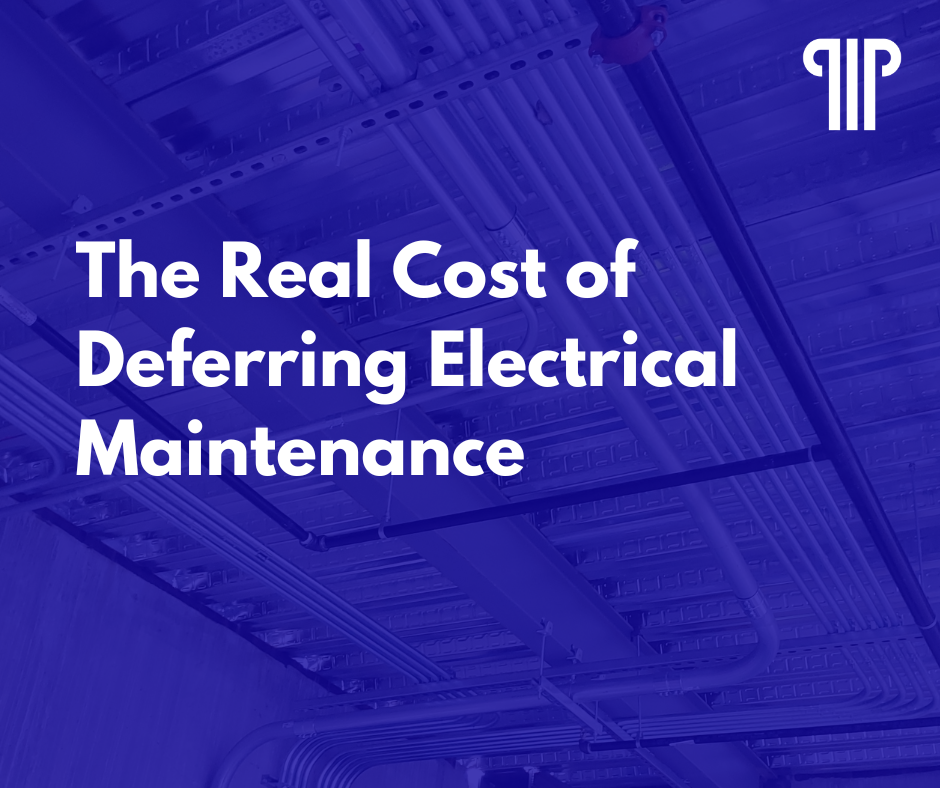
While deferring electrical maintenance might seem like a cost-saving measure in the short term, it can have far-reaching consequences and ultimately result in higher expenses and risks. Electrical systems are critical for maintaining day-to-day operations, and neglecting upkeep can lead to equipment failures, fire hazards, increased energy consumption, compliance issues, shortened equipment lifespans, safety risks for occupants, and potential legal or insurance complications.
- Equipment Failures: Equipment failures are one of the primary risks associated with deferred electrical maintenance. As electrical systems age and components degrade, the likelihood of breakdowns and malfunctions increases. Unplanned downtime can disrupt business operations, leading to financial losses, missed deadlines, and dissatisfied customers. The cost of emergency repairs and replacements can be significantly higher than routine maintenance expenses. In addition, equipment failures can pose safety hazards to occupants, potentially resulting in injuries or accidents that can lead to legal liabilities and damaged reputations.
- Fire Hazards: Neglected electrical systems are also prone to fire hazards. Faulty wiring, overloaded circuits, or inadequate grounding can all contribute to electrical fires. These incidents can cause extensive property damage, including the destruction of valuable assets, and pose significant risks to the lives of employees, customers, and visitors.
- Higher Energy Consumption: Another hidden cost of deferring electrical maintenance lies in the increased energy consumption of inefficient systems. Poorly maintained equipment, such as motors, transformers, or HVAC systems, may operate less efficiently, resulting in higher utility bills and unnecessary expenses. Energy-saving measures, such as cleaning and calibrating equipment, identifying and repairing energy leaks, or upgrading to more energy-efficient technologies, can help mitigate these costs. By neglecting such maintenance activities, businesses may unknowingly waste substantial amounts of energy and incur avoidable financial burdens.
- Compliance and Regulatory Issues: Compliance with electrical codes, regulations, and inspections is a crucial aspect of managing commercial properties. Authorities impose these requirements to ensure the safety of occupants and the proper functioning of electrical installations. Deferring maintenance can lead to non-compliance, subjecting property owners to fines, penalties, or even closure until the issues are rectified. Such disruptions can be not only costly but also tarnish the reputation of the business and hinder future operations.
- Reduced Equipment Lifespan: The lifespan of electrical equipment can be significantly shortened by neglecting maintenance. Routine inspections, cleaning, lubrication, and timely repairs help identify and address issues before they cause major damage. By deferring maintenance, property owners risk accelerating wear and tear on their electrical systems, resulting in premature failures and the need for costly replacements. Investing in regular maintenance can extend the lifespan of equipment, maximizing its value and reducing long-term costs.
- Safety Risks: Safety risks associated with deferred electrical maintenance are a matter of great concern. Faulty electrical systems can give rise to electrical shocks, electrocution, or other accidents that endanger the lives of building occupants. Employers have a responsibility to provide a safe working environment, and neglecting electrical maintenance compromises this obligation. The resulting injuries, loss of productivity, and potential legal liabilities can be far more costly than the preventive maintenance measures that could have averted such incidents.
- Insurance Issues: Deferring maintenance can have implications for insurance coverage as well. Insurance policies often require adherence to safety standards and routine maintenance. If an electrical incident occurs and it is determined that proper maintenance was neglected, insurance claims may be denied. Insurance companies may also raise premiums or require additional safety measures to mitigate risks, further increasing costs for property owners.
It is essential for property owners or managers to prioritize regular maintenance to mitigate these risks and ensure the safe and efficient operation of electrical systems.

